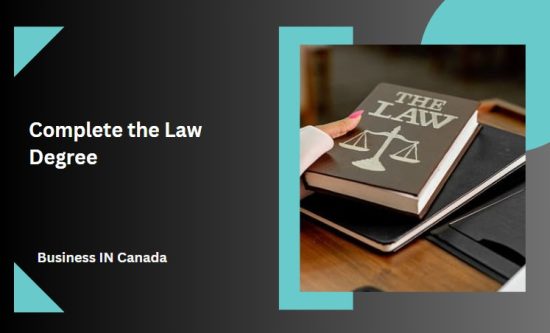Have you ever considered becoming a lawyer in Canada? If so, you may be wondering where to start or what steps are necessary to make your dream come true. Look no further! In this comprehensive guide, we will walk you through each step of how to become a lawyer in Canada. We’ve got you covered, from eligibility requirements to completing law school and passing exams. So grab your notebook, and let’s get started!
Eligibility for Becoming a Lawyer in Canada
Before embarking on the journey to becoming a lawyer in Canada, it’s essential to understand the eligibility requirements. Firstly, you must possess a Bachelor’s degree from an accredited university or institution. While no specific majors are required for law school admission, taking courses such as Political Science and Philosophy is recommended.
Additionally, students must have strong communication skills, both written and oral. It is also necessary to be able to analyze information and think logically critically.
Moreover, candidates applying for law school in Canada must write the Law School Admission Test (LSAT). This standardized test measures critical reading and analytical reasoning skills crucial for law school success.
It’s important to note that some Canadian provinces may have additional requirements beyond these general ones. For example, Quebec requires proficiency in French language skills as well.
Meeting these eligibility criteria sets individuals up for a promising career path toward becoming successful lawyer in Canada.
How to Become a Lawyer in Canada?

Becoming a lawyer in Canada requires dedication, hard work, and a lot of studying. It’s not an easy journey but can be professionally and personally rewarding.
To become a lawyer in Canada, you must first complete an undergraduate course. While no specific major is required for admission to law school, many students choose programs that will help them develop critical thinking, research abilities, and communication skills.
Complete an Undergraduate Course
Completing an undergraduate course is crucial to becoming a lawyer in Canada. Aspiring lawyers must have completed at least three years of undergraduate studies at an accredited university to be eligible for law school.
During the undergraduate program, students can choose any major they want, as there are no specific requirements for aspiring lawyers. However, some popular majors among law school applicants include political science, history, philosophy and English.
Apart from the major subjects, taking courses that will hone critical thinking skills and improve writing abilities is also important. These skills will come in handy during law school, where students are expected to analyze cases and present their arguments effectively.
Furthermore, maintaining high grades throughout the undergraduate program is essential since admission to law schools in Canada is highly competitive. A good grade point average (GPA) combined with volunteer work or internships related to legal fields can increase chances of acceptance into top-tiered schools.
Completing an undergraduate course is necessary for those aspiring to become successful lawyers in Canada. It provides a strong foundation that prepares students for the rigours of law school while also making them attractive candidates for admissions committees reviewing applications.
Take LSAT

The Law School Admission Test, or LSAT, is a standardized test that assesses reading and analytical reasoning skills. It’s one of the most important steps to becoming a lawyer in Canada. Your score on this exam will play a significant role in determining which law schools you’re eligible for.
The LSAT measures your ability to analyze information and draw logical conclusions critically. This test is designed to measure aptitude rather than knowledge, so don’t worry if you haven’t studied specific topics before taking it.
Before taking the LSAT, make sure you prepare adequately by studying sample questions and tests online or through prep courses. There are many resources available to help you familiarize yourself with the types of questions that appear on the test.
On test day, be sure to arrive early and bring all required materials, such as identification documents and pencils. The exam takes approximately 3 hours and 30 minutes, including breaks, so make sure to pace yourself accordingly.
Success on the LSAT requires practice, dedication, and preparation. With the effort put into preparing for this test, you have better chances of getting accepted at top law schools across Canada!
Apply to the Law School
After successfully completing the LSAT exam, the next step towards becoming a lawyer in Canada is applying to law school. This requires careful consideration of various factors such as location, cost, and specialization.
When searching for potential law schools to apply to, it’s important to research their admission requirements and deadlines. Some may require additional documents or essays, while others only need transcripts and references.
It’s also crucial to consider the reputation of the law school you’re interested in attending. Look into their faculty members, alumni networks, and ranking among other Canadian law schools.
In terms of cost, public institutions tend to have lower tuition fees compared to private ones. However, scholarships and financial aid options are available for both types of universities.
Think about your desired area of specialization when choosing a school. Different universities offer different programs that cater to certain legal fields, such as corporate law or environmental law.
Applying to a Canadian Law School can be competitive, but with proper research and preparation, one can increase their chances of acceptance into their desired program.
Complete the Law Degree

Completing the Law Degree is crucial to becoming a lawyer in Canada. Once you have been accepted into law school, it typically takes three years to complete your degree. During this time, you will study various areas of law, such as criminal, family, and corporate law.
Law school can be intense and demanding as students are expected to keep up with the rigorous academic schedule while also participating in extracurricular activities and internships. However, it’s important to stay focused on your end goal, which is to become a licensed practicing lawyer.
During your time in law school, you will learn about the legal system and learn important skills such as critical thinking and problem-solving essential for success in the field. You may also have opportunities to participate in moot court competitions or clinical programs that allow you to work with clients under supervision.
While completing your Law Degree is challenging, it’s important to remember that all your hard work will eventually pay off once you pass the Bar Exam and start practicing law. So stay motivated and committed throughout this process!
Complete Law Society Exams
Once you have completed your law degree, the next step is to take the Law Society Exams. These exams are designed to test your knowledge and skills in specific areas of law.
The Law Society Exams consist of the Barrister Examination and the Solicitor Examination. The Barrister Exam tests your knowledge of litigation, while the Solicitor Exam covers transactional work such as contracts and real estate.
Reviewing all relevant course materials from your law school classes is important to prepare for these exams. You can also consider taking a bar exam preparation course or working with a tutor.
It’s worth noting that passing these exams is required before moving on to articling (the practical training component), which is necessary before writing the Bar Exam.
Completing the Law Society Exams requires hard work and dedication. But once you pass them, you’ll be one step closer to becoming a licensed lawyer in Canada.
Complete Articling

Completing articling is the final practical step in becoming a lawyer in Canada. During this part of the process, aspiring lawyers work under the supervision of a licensed and experienced lawyer to gain hands-on experience and put their knowledge into practice.
Articling usually lasts for one year but can be extended based on certain circumstances. It involves working at a law firm or other legal organization where you observe court proceedings, participate in drafting legal documents and contracts, attend meetings with clients, and handle administrative tasks.
This is an essential part of the journey toward becoming a successful lawyer because it allows you to apply your academic learning to real-life situations. It also allows you to develop your communication skills and legal research abilities and learn how to manage client expectations.
The articling phase is highly competitive since most students aim for positions in prestigious law firms that offer higher salaries than many smaller firms. However, regardless of where you complete your articles or how long it takes, completing this stage successfully will enable you to move on to the next phase: taking the bar exam and officially practicing law!
Complete Bar Exam
Completing the Bar Exam is one of the final steps to becoming a licensed lawyer in Canada. This exam is a comprehensive assessment of your knowledge and skills in legal practice, covering various subjects such as constitutional law, criminal law, civil litigation, family law, property law, and more.
The format of the Bar Exam may vary depending on which province or territory you are taking it in. Generally speaking, though, it consists of both multiple-choice questions and essay-type questions that test your ability to analyze legal issues and apply relevant laws.
Preparing for the Bar Exam can be an intense process that requires discipline and dedication. You may need to spend months studying legal concepts and practicing your writing skills before feeling confident enough to take on this challenge.
On top of passing the Bar Exam itself, you will also need to meet other requirements set by your local Law Society before being granted a license to practice law. These may include character assessments, background checks, and ethical standards evaluations.
In summary, completing the Bar Exam marks a significant milestone towards becoming a lawyer in Canada, but it’s not just about passing it – meeting all other requirements is just as important for success in this career path!
Practice as a Lawyer

After obtaining your law degree, passing the Law Society exams and completing articling, you’re finally ready to practice as a lawyer in Canada. However, deciding on your area of specialization is important before jumping into legal practice.
As a new lawyer, you may choose to work at a law firm or start your own practice. It’s important to remember that starting your own practice requires significant financial investment and business acumen. Alternatively, working for an established law firm can offer valuable experience and mentorship opportunities.
In addition to choosing between starting your own practice or joining a law firm, it’s also important to consider which area of law aligns with your interests and skills. Some common areas of specialization include criminal law, family law, corporate law or intellectual property.
Once you have decided on the type of legal work that interests you the most, you can begin building relationships with clients while enhancing your knowledge and experience through continued professional development courses within their chosen niche.
Remember though – becoming successful as a lawyer takes time and hard work – but ultimately leads toward one of the most rewarding professions out there!
Conclusion
Becoming a lawyer in Canada requires a commitment to education and hard work throughout one’s career path. Building strong relationships with colleagues and clients while keeping updated on legal developments ensures success within the field and serves society responsibly through upholding ethical standards and seeking justice for all parties involved.
FAQ – How to Become a Lawyer in Canada?

How long does it take to become a lawyer in Canada?
Becoming a lawyer in Canada requires a significant amount of time and effort. The process can take three years to complete the law degree.
What are the requirements to become a lawyer in Canada?
If you’re wondering what it takes to become a lawyer in Canada, there are certain requirements that you need to fulfill. First and foremost, you must have completed an undergraduate degree from a recognized university or college.
After completing your undergraduate degree, the next step is to take the Law School Admission Test (LSAT). This exam measures your critical thinking skills and ability to analyze complex arguments. You’ll need to score well on this test if you want to gain admission into law school.
Once you’ve taken the LSAT and received a good score, you can then start applying for law schools in Canada. Remember that competition for spots at top-tier law schools can be fierce, so make sure your application stands out.
After being accepted into law school, it’s time to buckle down and complete the rigorous program of study. In addition to attending classes and lectures, students will also participate in moot court competitions and other legal clinics as part of their training.
Upon graduation from law school, aspiring lawyers must then pass exams administered by their respective provincial or territorial Law Society before becoming licensed practitioners. These exams cover various aspects of Canadian common law as well as ethics rules governing the profession.
Becoming a lawyer in Canada requires hard work, dedication, and perseverance – but those who succeed will join one of the most respected professions!
How much does law school cost in Canada?
Attending law school in Canada is a significant investment of both time and money. The cost of tuition varies depending on the university you choose to attend, but you can expect to pay anywhere from $15,000 to $30,000 per year.
However, it’s important to keep in mind that these costs don’t include additional expenses such as textbooks, housing, and other living expenses, which can add up quickly. These extra costs are estimated at around $15,000 per year.
Suppose the financial burden seems overwhelming for some individuals who aspire to become lawyers in Canada or have limited resources. In that case, there are scholarship programs available for students who meet their requirements. You could also consider working part-time while studying or applying for student loans.
It’s important to research before deciding where to attend law school because the fees vary greatly between provinces and universities. Some schools also offer scholarships or bursaries that may help offset some of the costs associated with attending law school.
In short, becoming a lawyer in Canada requires a considerable financial commitment, but there are options available if funding is an issue.
How much does a lawyer get paid in Canada?
As a lawyer in Canada, the salary you can expect to earn will depend on several factors. Firstly, the type of law you practice and the size of the firm or organization you work for will play a significant role in determining your earnings.
According to PayScale, the average annual income for lawyers in Canada is around $126,000. However, this can vary significantly based on location – with lawyers in Toronto earning an average of $105,000 per year compared to those practicing law in Winnipeg, who earns an average of CAD$102,000 per year.
How much does it cost to take the bar exam in Canada?
Becoming a lawyer in Canada requires hard work, dedication and determination. It is a lengthy process that involves completing an undergraduate degree, obtaining a law degree from an accredited institution, passing several exams and articling under the supervision of a licensed lawyer.
The total cost of becoming a lawyer in Canada can vary depending on various factors, such as the university you attend for your law degree program or where you live in Canada. Law school tuition fees typically range between $10,000 to $35,000 per year and may increase with inflation rates.
In addition to tuition fees, there are costs associated with taking exams required by the Law Society, including LSATs which cost approximately $200-300. The Bar exam also has its set fee, which varies from province to province but is generally from $500.
Despite these financial challenges that aspiring lawyers face during their education journey in Canada be rest assured that it is all worth it in the end because being called to practice as a lawyer comes with many benefits, including fulfilling work-life balance and competitive pay compared to other professions irrespective of what field one chooses – whether corporate or personal injury litigation or any other legal specialization.










